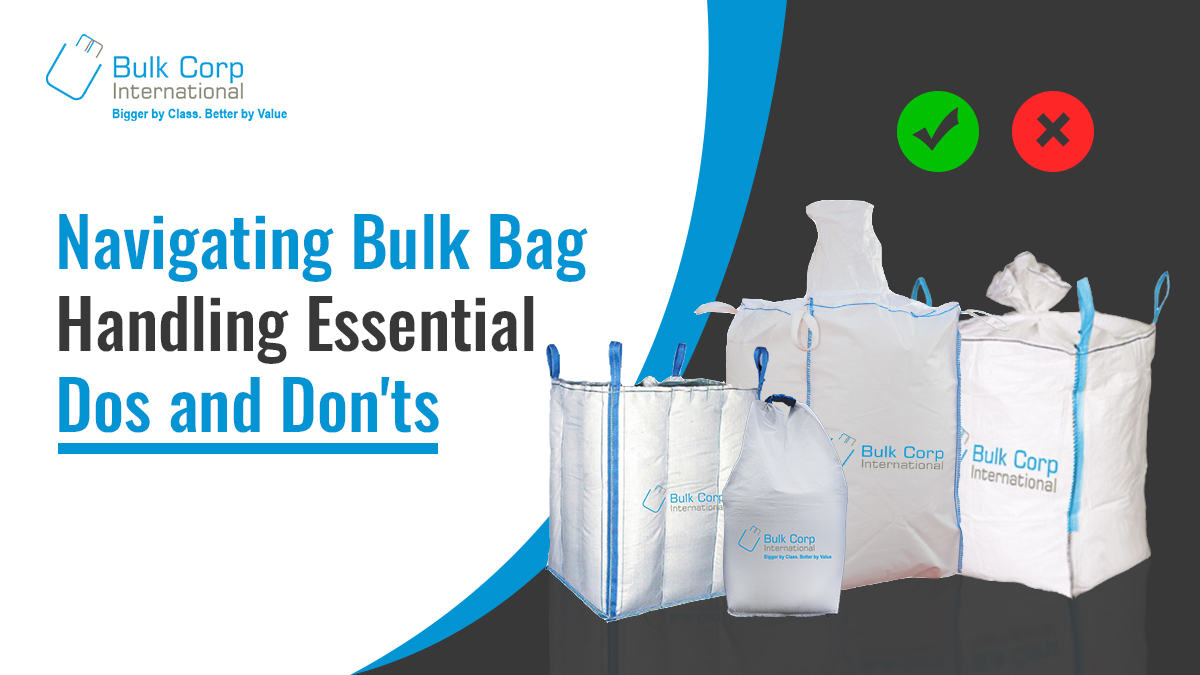Navigating Bulk Bag Handling: Essential Dos and Don’ts

Handling bulk bags is an essential part of many sectors, including manufacturing and agriculture. Known as FIBCs (Flexible Intermediate Bulk Containers), these big, flexible containers are made to efficiently transport and store bulk goods. Mishandling them, however, can result in mishaps, harmed goods, and interruptions to business as usual. When handling bulk bags, it’s critical to follow certain dos and don’ts to guarantee both safety and efficient operations.
The Dos of Bulk Bag Handling
1. Select the Right FIBC Bulk Bags
Collaborate closely with your bulk bag manufacturer or supplier to choose the most suitable FIBCs for your specific needs. This ensures that factors such as capacity, size, and material are aligned with your requirements. Bulkcorp International provides several customized options to make your bulk handling more efficient and reliable.
2. Read the Instructions Label
Before use, thoroughly review the instruction label on each bulk bag. This contains vital information regarding maximum weight capacity, handling guidelines, and safety precautions, which must be heeded to prevent accidents.
3. Inspect Reusable FIBC
If planning to reuse FIBCs, conduct a thorough inspection for any flaws or damages that could compromise their integrity. Ensuring the absence of defects is crucial to prevent potential breakage or leakage during handling.
4. Check the Discharge Spout
Prior to filling bulk bags, verify that the discharge spout (if present) is securely closed to prevent any spillage of contents during transportation.
5. Ensure Stability
Confirm that bulk bags are stable and properly supported to prevent toppling over once filled, minimizing the risk of accidents or damage.
6. Close the Top Inlet Correctly
Properly seal the top inlet of bulk bags to safeguard their contents during transportation, ensuring that no components are exposed to potential hazards.
7. Use Lifting Equipment With Sufficient Capacity
Employ lifting equipment that can adequately support the weight of suspended bulk bags, minimizing the risk of accidents and injuries.
8. Ensure Adequate Size Lifting Devices
Utilize lifting devices with the correct size and minimum radius to prevent damage to the bulk bags or their suspensions.
9. Address Static Electricity Hazards
Take necessary precautions to mitigate static electricity hazards, reducing the risk of fire incidents during handling.
10. Protect from Environmental Elements
Shield bulk bags from rain and direct sunlight to prevent damage to both the containers and their contents.
11. Secure Transportation
During transit, ensure that bulk bags are adequately secured to prevent shifting or spilling of contents, enhancing safety and minimizing losses. However, several bulk bags offer no spillage features making them a reliable and go-to solution for bulk handling.
The Don’ts of Bulk Bag Handling
1. Avoid Choosing FIBCs Without Consultation
Never select bulk bags without consulting manufacturers or suppliers, as this may lead to inappropriate choices for the intended application. At Bulkcorp International, we have experts who guide you through the customization and selection procedure.
2. Never Exceed Safe Working Load (SWL)
Never surpass the SWL specified for bulk bags to avoid compromising their structural integrity or risking personnel safety.
3. Avoid Uneven Filling
To maintain stability and integrity, refrain from unevenly filling bulk bags, as this may lead to instability and potential damage.
4. Steer Clear of Abrupt Stops or Starts
Avoid sudden stops or starts during transportation to prevent damage to bulk bags and their contents, as well as potential hazards to personnel.
5. Prevent Snatch Lifts and Jerks
Eliminate snatch lifts and jerks during handling to protect both workers and the integrity of bulk bags and their contents.
6. Do Not Allow Personnel Under Suspended Loads
Prohibit personnel from standing beneath suspended bulk bags to mitigate the risk of injury in case of accidents.
7. Avoid Overhang
Prevent bulk bags from projecting over the sides of vehicles or pallets to minimize risks to personnel and potential damage.
8. Avoid Unstable Stacking
Do not stack bulk bags unless confident in their stability, as unstable stacking may lead to collapse and damage.
9. Do Not Use in Extreme Conditions Without Approval
Avoid using bulk bags in extreme conditions without manufacturer or supplier approval, as this may compromise their performance and safety.
10. Do Not Reuse Single-Trip Bulk Bags
Single-trip bulk bags are designed for one-time use only and should not be reused to ensure optimal performance and safety.
By adhering to these dos and don’ts of bulk bag handling, businesses can enhance safety, optimize efficiency, and protect valuable assets throughout the storage and transportation process. Prioritizing proper handling procedures is essential to maximize the benefits of bulk bags while minimizing risks and ensuring successful operations. To explore more about bulk bag handling, contact us at +91-79-29795319 or email info@bulkcorp-int.com





